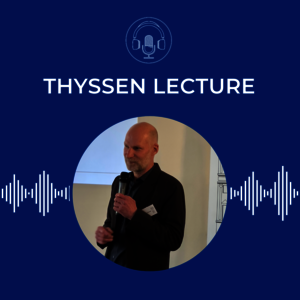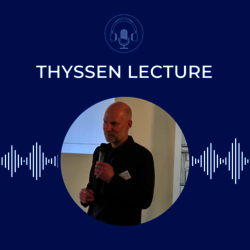 GHIL Podcast
GHIL Podcast

Thyssen Lecture
Sebastian Conrad
Colonial Times, Global Times: History and Imperial World-Making
1 May 2024
(0:50 h)

Thyssen Lecture
Sebastian Conrad
Colonial Times, Global Times: History and Imperial World-Making
Thyssen Lecture, given 15 May 2023
How do imperial legacies shape present-day academia and knowledge production? How are the colonial past, and obligations arising from it, debated today? What role do they play in political relations within Europe, and in Europe’s relations with the rest of the world? These are some of the questions we seek to address in our new 8-lecture-series in cooperation with the Fritz Thyssen Foundation on “Science, Knowledge and the Legacy of Empire”.
This podcast episode is a recording of the second lecture in the series given by Sebastian Conrad, Professor of Modern History at the Free University of Berlin, under the title ‘Colonial Times, Global Times: History and Imperial World-Making’.
Sebastian Conrad’s lecture explores how the construction of a particular, western notion of time and temporality, of modernity, was central to the constitution of western imperial hierarchies in Asia in the nineteenth and early twentieth centuries. Drawing on examples such as the alignment of calendars, the synchronisation of clocks and the writing of history, Conrad argues that, as producers of historical time narratives in the process of imperial ‘world-making’, historians became imperial agents and world-makers in their own right. But was this purely a colonial imposition, or a response to global conditions? What are the lasting effects of this reshaping of temporality, and how does it influence us today?
Sebastian Conrad is Professor of Modern History at the Free University of Berlin. His work has focused on issues of coloniality/postcoloniality, global history, intellectual history, the history of nationalism, and the theory of history. At the Free University he directs the MA programme ‘Global History’ and the graduate school in ‘Global Intellectual History’. Among his publications are What is Global History? (Princeton University Press, 2016); German Colonialism: A Short History (Cambridge University Press, 2012); An Emerging Modern World, 1750–1870(Harvard University Press, 2018, edited with Jürgen Osterhammel); and ‘Enlightenment in Global History’, American Historical Review, 117/4 (2012), 999–1027.
You can also read a publication of this lecture in Open Access.